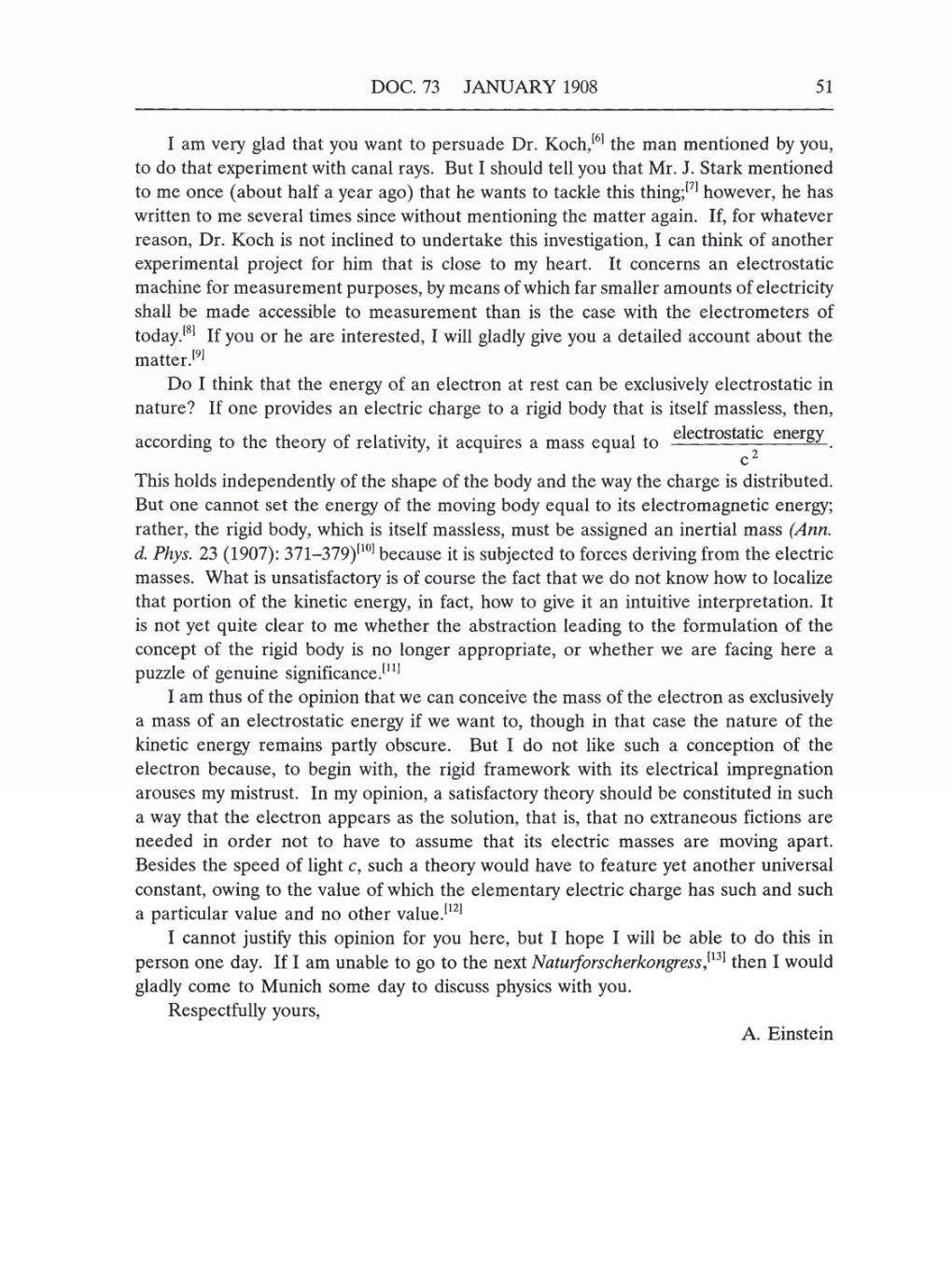DOC.
73
JANUARY
1908 51
I
am very glad
that
you
want to
persuade
Dr.
Koch,[6]
the
man
mentioned
by you,
to
do
that
experiment
with canal
rays.
But
I
should tell
you
that
Mr. J.
Stark mentioned
to
me once
(about
half
a
year
ago)
that
he
wants to
tackle this
thing;[7]
however,
he has
written
to
me
several
times since
without
mentioning
the
matter
again.
If,
for whatever
reason,
Dr.
Koch
is not
inclined
to
undertake
this
investigation,
I
can
think of another
experimental project
for him
that
is close to
my
heart.
It
concerns an
electrostatic
machine
for
measurement
purposes,
by means
of
which
far smaller
amounts
of
electricity
shall be
made
accessible to measurement
than
is
the
case
with
the electrometers of
today.[8]
If
you or
he
are
interested, I will
gladly give you a
detailed
account
about the
matter.[9]
Do I
think that the
energy
of
an
electron
at
rest
can
be
exclusively
electrostatic
in
nature? If
one
provides
an
electric
charge
to
a rigid body
that
is
itself
massless,
then,
according
to
the
theory
of
relativity,
it
acquires
a mass
equal to
electrostatic
energy.
c2
This holds
independently
of
the
shape
of the
body
and
the
way
the
charge is
distributed.
But
one
cannot set
the
energy
of the
moving body
equal
to
its
electromagnetic
energy;
rather,
the
rigid body,
which
is
itself
massless,
must
be
assigned an
inertial
mass (Ann.
d. Phys.
23
(1907):
371-379)[10]
because
it
is
subjected
to forces
deriving
from the electric
masses.
What
is
unsatisfactory
is
of
course
the
fact
that
we
do
not
know how
to
localize
that
portion
of the kinetic
energy,
in
fact,
how
to
give
it
an
intuitive
interpretation.
It
is
not
yet
quite
clear
to
me
whether
the
abstraction
leading to
the formulation of
the
concept
of the
rigid body
is
no
longer appropriate,
or
whether
we are
facing
here
a
puzzle
of
genuine
significance.[11]
I
am
thus of
the
opinion
that
we can
conceive the
mass
of
the
electron
as
exclusively
a mass
of
an
electrostatic
energy
if
we
want to, though
in
that
case
the
nature
of
the
kinetic
energy
remains
partly
obscure. But I
do not like
such
a
conception
of
the
electron
because, to
begin with,
the
rigid
framework
with its
electrical
impregnation
arouses my
mistrust. In
my opinion,
a
satisfactory
theory
should be
constituted
in
such
a
way
that the electron
appears
as
the
solution,
that
is,
that
no
extraneous
fictions
are
needed
in
order
not
to have to
assume
that
its
electric
masses are
moving
apart.
Besides
the
speed
of
light c,
such
a
theory
would have to
feature
yet
another universal
constant,
owing
to
the
value
of
which
the
elementary
electric
charge
has such
and
such
a
particular
value and
no
other
value.[12]
I cannot
justify
this
opinion
for
you
here,
but
I
hope
I will
be able
to
do this in
person
one day.
If I
am
unable
to
go
to
the
next
Naturforscherkongress,[13]
then
I would
gladly
come
to Munich
some
day
to
discuss
physics
with
you.
Respectfully yours,
A.
Einstein
